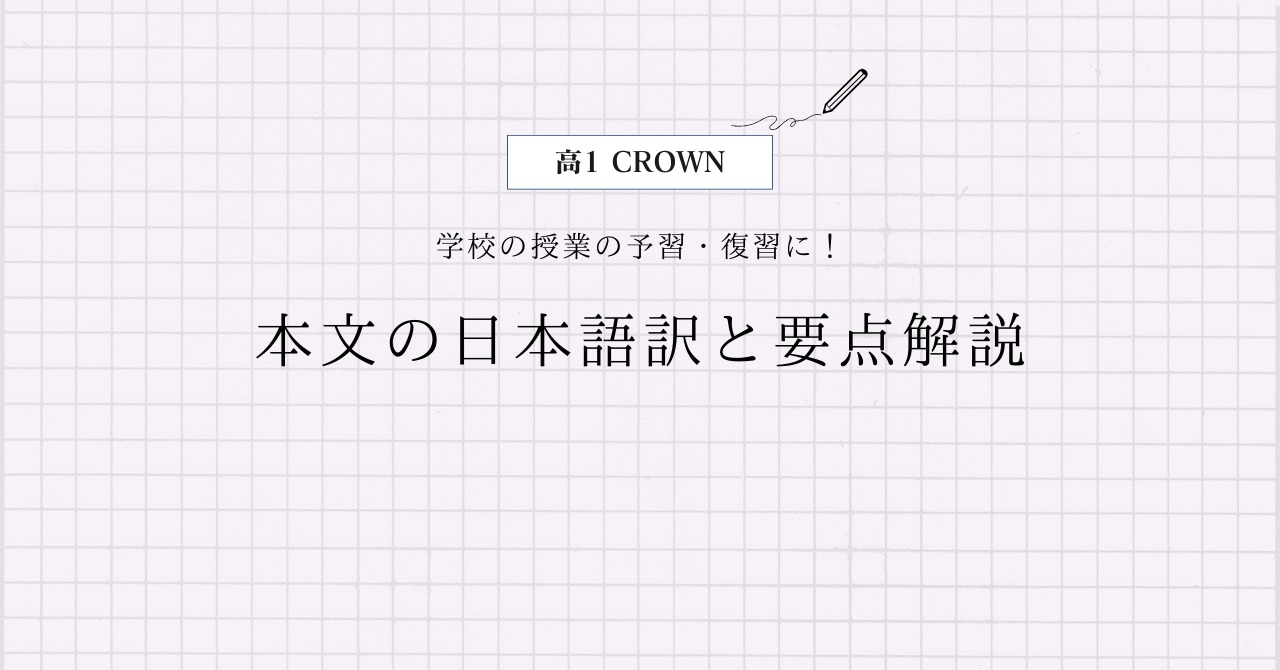三省堂 高1CROWN English Communication1 Lesson10 Section4の本文の日本語訳と重要箇所の解説です。
Section10-1, 10-2, 10-3, 10-5の解説はこちらからご覧ください。
>高1CROWN English Communication1 Lesson10 Section1 本文和訳
>高1CROWN English Communication1 Lesson10 Section2 本文和訳
>高1CROWN English Communication1 Lesson10 Section3 本文和訳
>高1CROWN English Communication1 Lesson10 Section5 本文和訳
- CROWN English Communication1 Lesson10 Section4 本文と日本語訳
- CROWN English Communication1 Lesson10 Section4 重要事項の解説
- The Peanuts cartoons are not funny in the ordinary way.
- We are more likely to smile than to burst out laughing.
- But somehow they make us feel good.
- We want to see Charlie Brown and Linus and Snoopy and all the other Peanuts characters again tomorrow in our newspaper.
- If they are not there, we will miss them as we might miss a friend who has gone away.
- It is not because our friend always makes us laugh, but because he always makes us feel good about ourselves.
- Charles M. Schulz seems to suggest that real success in life is not a matter of money, fame, and power.
- Rather, it is defined by hope, courage, respect for others and, above all, by a sense of humor.
- He used to say,
- “If I were given the opportunity to present a gift to young people, it would be the ability for each individual to learn to laugh at himself.”
- CROWN English Communication1 Lesson10 Section4 まとめ
CROWN English Communication1 Lesson10 Section4 本文と日本語訳
The Peanuts cartoons are not funny in the ordinary way.
「漫画ピーナッツは普通だったらおもしろくはありません。」
We are more likely to smile than to burst out laughing.
「爆笑するよりも微笑むことの方が多いです。」
But somehow they make us feel good.
「しかし、どういうわけか私たちの気分を良くします。」
We want to see Charlie Brown and Linus and Snoopy and all the other Peanuts characters again tomorrow in our newspaper.
「私たちは明日もまた新聞で、チャーリー・ブラウンとライナス、スヌーピー、そして他のピーナッツのキャラクターを見たくなります。」
If they are not there, we will miss them as we might miss a friend who has gone away.
「もし彼らがそこにいなかったら、いなくなってしまった友達を寂しく思うかのように、彼らのことを寂しく思うでしょう。」
It is not because our friend always makes us laugh, but because he always makes us feel good about ourselves.
「それは友達が私たちのことを笑わせてくれるからではなく、友達はいつも私たちを良い気分にさせてくれるからです。」
Charles M. Schulz seems to suggest that real success in life is not a matter of money, fame, and power.
「チャールズ・モンロー・シュルツは、人生における真の成功とはお金、名声、そして権力の問題ではないということを示唆しているように思えます。」
Rather, it is defined by hope, courage, respect for others and, above all, by a sense of humor.
「むしろ、真の成功とは希望、勇気、他者からの尊敬、そして何よりも、ユーモアの感覚によって定義されます。」
He used to say,
「彼はかつてこう言っていました。」
“If I were given the opportunity to present a gift to young people, it would be the ability for each individual to learn to laugh at himself.”
『もし私が若者に贈り物を渡す機会が与えられたら、その贈り物は、一人ひとりが自分自身を笑ってあげることを学ぶ能力にするでしょう。』

CROWN English Communication1 Lesson10 Section4 重要事項の解説
The Peanuts cartoons are not funny in the ordinary way.
“cartoon”は「漫画」、“way”は「点、道、方法」といった名詞になります。
“funny“は「おかしい、面白い」、“ordinary”は「普通の、通常の」という形容詞ですね。
“in the ordinary way”は「普通では」くらいで訳せばOKです。
We are more likely to smile than to burst out laughing.
“be likely to 動詞の原形”で「~しそうである、~する可能性がある」という重要表現です。
今回は“likely”という副詞に“more”が付いているので、「比較級」になっていますね。
“smile”は「微笑む」という動詞で、“burst out laughing”は「爆笑する」という表現です。
But somehow they make us feel good.
“somehow”は「どういうわけか」という副詞です。
“they”は“The Peanuts cartoons”を指していますね。
“make 人・もの 動詞の原形”で「人・ものに~させる」という使役の意味になります。
“feel”は「感じる」という動詞で、“feel good”は「気分が良い、気持ち良い」といった意味ですね。
We want to see Charlie Brown and Linus and Snoopy and all the other Peanuts characters again tomorrow in our newspaper.
“want to 動詞の原形”で「~したい」という重要表現です!「不定詞の名詞的用法」と一緒に確認しておきましょう。
“all the 名詞”は,“all of the 名詞”の“of”が省略された形です。“all”の品詞としては「代名詞」にあたります。だから冠詞“the”の前にあるんですね。
ただ,訳すときはふつうに前から「すべての名詞」と訳してOKです。つまりは“all 名詞”という形と意味は同じになります。
“other”は「他の」という形容詞で、“character”は「登場人物、キャラクター」という名詞ですね。
“again”は「再び、もう一度」という副詞になります。
If they are not there, we will miss them as we might miss a friend who has gone away.
この文では「接続詞if」が使われていますね。“there”は「そこに」という副詞で、ここでは“in our newspaper”を指していますね。
“miss”は「を寂しく思う、恋しく思う、逃す」といった動詞で、“them”は“Charlie Brown and Linus and Snoopy and all the other Peanuts characters”を指しています。
“as”は「~するように」という接続詞です。接続詞“as”は5つの意味があるので、文脈に応じて訳を考えないといけません。以下に“as”の意味をまとめておきます。
“might”は「~かもしれない」という助動詞“may”の過去形ですが,今回のように現在形の文でも使うことができます。その場合は“may”よりも可能性の低い推量の意味になります。
“who”は「主格の関係代名詞」で,“who has gone away”が先行詞“a friend”を修飾しています。
“go away”は「いなくなる、どこかへ行く」といった意味で、ここでは「現在完了」になっていますね。
It is not because our friend always makes us laugh, but because he always makes us feel good about ourselves.
“not because A, but because B”で「AではなくBだからだ」という重要表現です。
“It”は直前の文全体を、“he”は“our friend”を指しています。
“always”は「いつも」という副詞で、“make 人・もの 動詞の原形”は「人・ものに~させる」という使役の意味でしたね。
“laugh”は「笑う」という動詞で、“feel good about oneself”は「自分が良い気分になる、自分に自信を持つ」といった意味になります。
“ourselves”は「私たち自身」という再帰代名詞です。
Charles M. Schulz seems to suggest that real success in life is not a matter of money, fame, and power.
“seem”は「~と思われる、~のように見える」という動詞で、“seem to 動詞の原形”で「~するように思われる」となります。
“suggest”は「を提案する、示唆する」という動詞で、後ろには「接続詞that」がありますね。
“real”は「本当の、真の」という形容詞で、“success”は「成功」、“life”は「人生、生活、生命」、“matter”は「問題、事柄」、“fame”は「名声」、“power”は「力、権力」という名詞になります。
“of”は前置詞で,”A of B”の形で「BのA」というように後ろから前に訳します。
Rather, it is defined by hope, courage, respect for others and, above all, by a sense of humor.
“rather”は「むしろ」という副詞です。
“it”は“real success in life”を指していますね。
“difine”は「を定義する」という動詞で、ここでは「受動態」になっています。
“hope”は「希望、望み」、“courage”は「勇気」、“respect”は「尊敬、敬意」、“other”は「他者」、“sense”は「感覚、センス」、“humor”は「ユーモア、おかしさ」という名詞になります。
“above all”は「何よりも」という表現です。
He used to say,
“used to 動詞の原形”は「かつて~した」という「今はしていない過去の習慣」を表す重要表現です。
ちなみに発音は「ユーストゥ」で、「ユーズ」と濁らないので要注意ですよ!
“If I were given the opportunity to present a gift to young people, it would be the ability for each individual to learn to laugh at himself.”
この文は「仮定法過去」が使われていますね。
前半は「受動態」になっていて、“opportunity”は「機会」、“gift”は「贈り物」という名詞で、“present”は「を渡す、プレゼントする」という動詞になります。
“it”は“a gift”を指していて、“ability”は「能力」、“individual”は「個人」という名詞、“each”は「それぞれの」という形容詞です。
“for each indivisual”は後ろに続く「不定詞」の意味上の主語になっていますね。
“learn”は「を学ぶ、習得する」、“laugh at~”は「~を笑う」という動詞です。“to learn”は「不定詞の形容詞的用法」で“the ability”を修飾していて、“to laugh”は「不定詞の名詞的用法」になります。
“himself”は「彼自身」という再帰代名詞です。ここでは“each individual”のことを指していますね。
CROWN English Communication1 Lesson10 Section4 まとめ
以上がCROWN English Communication1 Lesson10 Section4の日本語訳となります。
「関係詞」「仮定法」などの使い方をしっかり確認しておきましょう!
>高1CROWN English Communication1 Lesson10 Section1 本文和訳
>高1CROWN English Communication1 Lesson10 Section2 本文和訳
>高1CROWN English Communication1 Lesson10 Section3 本文和訳
>高1CROWN English Communication1 Lesson10 Section5 本文和訳
何か分からない点や他に解説してほしい点があれば,お気軽にコメントしてください!



コメント